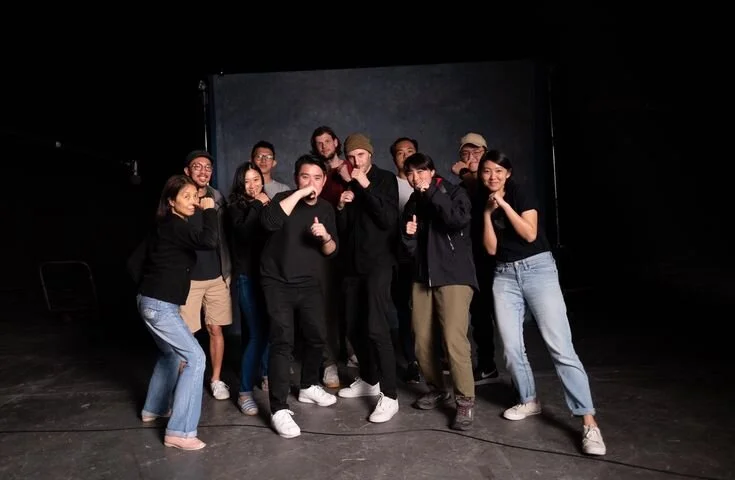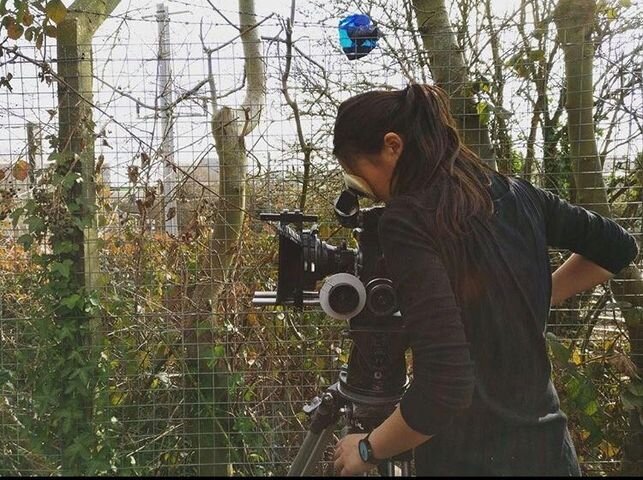【Video】Calif Chong | Filmmaker—Creating a collective database and capturing the Hong Kong spirit
Calif Chong is a filmmaker currently based in the UK. She worked as a scriptwriter at TVB and a documentarian for RTHK. A few years ago, she began her studies in Europe and started her career in the film industry, with the aim of finding a new way to tell the story of Hong Kong.
“How could we keep a record of the city we love so dearly, to let people understand the history of Hong Kong and the identity of Hongkongers, to capture the spirit of Hong Kong via visuals and audio? Other than protests, what else could we talk about?”
Journalist: Mehporpor
Translator: Imspeechless
Video Editor: Silver Wolf
Photos: Provided by interviewee
I’m a rather nostalgic person. In my eyes, the most breathtaking view of Hong Kong is one of streets with glowing neon lights, and the most amazing people are the craftsmen of the older generation. I love watching them make tofu, tailor clothes, create signs... Dedicating their whole lives to perfect a craft.
Calif assisted in the production of Bruce Lee "30 for 30: Be Water" documentary
The same goes for the film industry. The video editors from the older generation hung scrolls of films hundreds of thousands feet long from the ceiling and went through each frame closely, one by one. The golden age of Hong Kong gave rise to the legend of Hong Kong films—from the 60s when the industrial sector began to boom, Hong Kong rose from a place that lacked water to become the Hollywood of the East with a blooming cultural industry, all within two or three decades. Last year, I participated in the editing process of a documentary about Bruce Lee. Bruce Lee fought for his place in America that was filled with discrimination, sculpting himself into a legend across race, culture and spatial boundaries. To me, his story is the story of the older generation of Hongkongers.
It’s an era I haven’t experienced. Hong Kong is far behind those glorious days. Since the Anti-ELAB protests last year, I have been watching clips from Enjoy Yourself Tonight (《歡樂今宵》) at work, while looking at the streets pungent with tear gas after work. My feelings were mixed: why had Hong Kong gotten so much worse in just a hundred days? The British colleagues I was working with even compared Bruce Lee’s death to the death of Hong Kong. I always reminisce about the past. Seeing the glory of Hong Kong slowly fading away, I became anxious. How could we keep a record of the city we love so dearly, to let people understand the history of Hong Kong and the identity of Hongkongers, to capture the spirit of Hong Kong via visuals and audio? Other than protests, what else could we talk about?
If I have to describe the Hong Kong spirit, the first thing that comes to my mind is a phrase from an ad, “It’s creative, I like that”. These words exemplify the creative and flexible characteristics of Hongkongers. Secondly, having “solid skills”. As the Chinese saying goes, “Someone who has skills is the real master”. To me, Hongkongers never take shortcuts, never accomplish things through the back door, never bribe. Everything is solidly done. Thirdly, “diversity”. Hong Kong is a city that reserves a place for everyone, where multiple cultures are championed. I believe we need to put more work into cultural conservation to pass this spirit on. I really like Lindsay Varty’s Sunset Survivors. She uses her words and images to document disappearing crafts of the city.
As a filmmaker, I hope to use videos to preserve every corner and face of the city, so that audiences from all around the world see and hear not just about the protests, but also about our daily lives. Recently, I interviewed filmmaking master Mr. Chang Yao-chung through a video call, who has edited over 200 movies—it is fair to say that he himself is a living history.
We always say we want to connect with the international community. But if we want the world to pay attention to us or to study us, we cannot simply talk about social movements and politics, we cannot just let people know that we are protesting and asking for sympathy. If we want our stories to be heard globally, we have to write human stories, stories touching matters of joy and sorrow, parting and reunion, life and death, as well as ones that are entertaining. Foreign audiences’ impression of Hong Kong may be of caged homes, dense high rises, Jackie Chan or kung fu, but we must break these stereotypical impressions, we cannot repeatedly chant about “the Lion Rock spirit”, just like how Japanese movies are not all about manga and Korean ones are not always about k-pop. There are beautiful mountains and glistening waters, farms and markets, as well as top-notch technologies and inventions here. We need to find a captivating angle to let the audience see more of what the city has to offer.
Yes, we may be going through immense trauma, so we tell stories about the trauma - just as how scar literature appeared in Mainland China to paint a picture of the grief and sorrows of that era. Art carries our emotions, hardships, philosophies and political thoughts. I hope that filmmakers, myself included, could overcome pessimism and incorporate into our works the stream of consciousness, social awareness and humanistic attitudes. On top of that, to not just depict the heroism in protests, but also to use different genres like sketches of life, suspense, or even comedy to portray these themes, allowing more space for imagination.
I am naive, I deeply believe in the power of film. Even though there is not much we can do in the real world, each of us can blossom in the parallel universe of films and imagine a future of ours. In an era of new media, I hope every citizen can take part in creating records and production. I look forward to collectively building a database of Hong Kong, storing its images. Everyone can use their phones to make videos, use social media and even contribute to overseas news channels, in order to spread the story of Hong Kong. We need to tell the world that Hongkongers are not just victims, but also a perseverant, capable and creative group. I believe our small efforts can add up to a lot, making Hong Kong shine, just like its neon lights that I adore.
“I am Calif Chong. I am a HKer. ”
Support our Journalism with a Contribution
Many people might not know this, but despite our large team of contributors, which we are immensely grateful for, We Are HKers is still a small bootstrapped group that runs on no outside funding and loans. Everything you see today is built on the backs of warriors who have sacrificed opportunities, time, meals and sleep to help give HKers all over the world a voice and keep our culture alive.
However, we still face many trials in the running of our platform, from finding the necessary equipment for our video interviews, to subscribing to the necessary tools to facilitate our remote work process of our global team, to trying not to get fired from our main jobs as we run this project secretly in the background, and to keeping our platform running and storing our files securely.
We hope you consider making a contribution, so we can continue to provide you with moving stories of HKers all over the world and keep our heritage and culture alive. Even a £1 contribution goes a long way. Thank you for everyone’s support. We love you all and can’t appreciate you guys enough.
**Please note that your support of We Are HKers Ltd. does NOT constitute a charitable donation. We really appreciate your support in independent journalism. If you have any questions about contributing to We Are HKers, please contact us here.
- February 2022
- December 2021
- August 2021
- May 2021
- April 2021
- March 2021
- February 2021
- January 2021
- December 2020
- November 2020
- October 2020
- September 2020
- August 2020
- July 2020
- June 2020
- May 2020
- April 2020
- March 2020
- February 2020
- January 2020
- December 2019
- November 2019
- October 2019
- September 2019
- July 2019
- June 2019






















